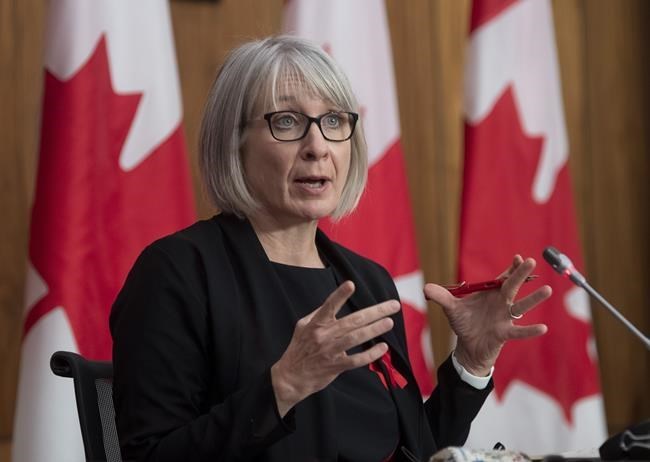
Minister of Health Patty Hajdu responds to a question during a news conference Tuesday Dec. 1, 2020 in Ottawa. THE CANADIAN PRESS/Adrian Wyld
Republished August 05, 2021 - 3:37 PM
Original Publication Date August 05, 2021 - 8:26 AM
CALGARY - Alberta's top doctor is defending the province's plan to lift all its COVID-19 public health restrictions despite mounting concerns from physicians and political leaders across Canada, including federal Health Minister Patty Hajdu.
In a letter to Alberta Health Minister Tyler Shandro, Hajdu said she agrees with the Canadian Paediatric Society's description of the province's move as an "unnecessary and risky gamble."
Hajdu said recent modelling for Alberta forecasts a more serious resurgence in cases fuelled by the Delta variant, and all governments need to take reasonable steps to protect Canadians.
"The vaccination campaign in Canada, one of the best in the world, has significantly changed the overall context of COVID-19 here," wrote Hajdu. "However, it is still too early to declare victory.
"Many remain unvaccinated, creating the potential for outbreaks, and we need to increase first and second dose coverage in order to protect against a Delta-driven resurgence that could seriously impact our citizens and our health system capacity."
Hajdu said she wants to better understand the rationale and science behind Alberta's decision.
Last week, the province ended contract tracing and said close contacts of people who test positive for COVID-19 are not required to isolate. And starting Aug. 16, those infected will no longer need to quarantine.
Dr. Deena Hinshaw, Alberta's chief medical officer of health, told The Canadian Press on Thursday that the decision was made after her team reviewed data on age-specific outcomes related to COVID-19, vaccine effectiveness and modelling on transmission of the Delta variant and related health outcomes.
Hinshaw said they also studied other jurisdictions, like the United Kingdom, which saw an uptick in the Delta variant before Alberta, to determine risks related to eliminating restrictions.
"We expect that we'll see a rise in cases and they will continue to rise for about a month. But the impact on severe outcomes and on acute care will be greatly mitigated by vaccines," said Hinshaw.
Her comments came as Alberta recorded 397 new cases of COVID-19 — the largest single-day spike since June 1. Active cases now total 2,526.
While Hinshaw acknowledged concerns from Albertans about the "hard and rapid shift," she said timing is the most important question.
"What I think has not been a part of the conversation is the risk of maintaining the status quo," she said.
If Alberta continues to treat COVID-19 as its biggest risk and focuses all of its resources on it, the province will accumulate a backlog of other problems, Hinshaw explained.
Dropping isolation, testing and contact tracing measures before the fall will help Alberta prepare for an expected spike in other respiratory illnesses, she said, and it will free up acute care and public health resources.
Hinshaw stressed, however, that people who get sick with COVID-19 or any other transmissible illnesses should isolate despite not being legally required to.
If Alberta's acute care system is again overwhelmed or a new variant poses a significant threat, Hinshaw said the province will reconsider reinstating public health measures.
Dr. Zain Chagla, an infectious disease specialist at St. Joseph's Healthcare Hamilton, said vaccines are slowing the spread and severity of the virus but there remains "vulnerable pockets where COVID-19 can transmit."
He said this includes children who aren't eligible to get vaccinated, immunocompromised people and segments of the population with lower vaccine uptake.
“There are pockets of unvaccinated and they can overwhelm a health-care system," said Chagla. "Using easy mitigation tools, like contact tracing, like masking is probably not unreasonable until we get to the highest percentage we can vaccinated.”
Just over 66 per cent of eligible Albertans are fully vaccinated.
Shandro declined to comment on Hajdu's letter Thursday but criticized the federal minister on social media.
"Minister Hajdu noticeably neglected to write a letter to Saskatchewan despite (us) having similar approaches to the COVID-19 pandemic. Instead, Ms. Hajdu chose to target Alberta — the Trudeau Liberals' favourite punching bag," he wrote, before condemning the federal government's track record on addressing COVID-19.
Shandro said Hinshaw and her team's recommendations to lift health measures are "in line with the science."
This report by The Canadian Press was first published Aug. 5, 2021.
— With files by Mia Rabson in Ottawa
News from © The Canadian Press, 2021